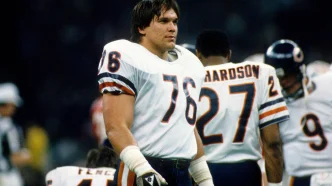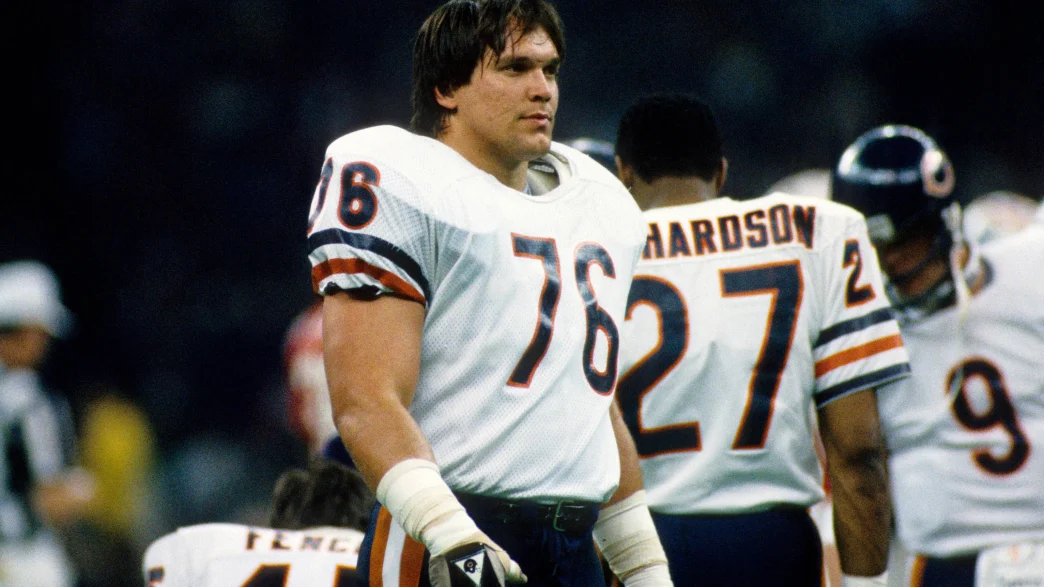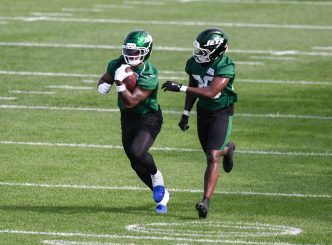With his towering frame and larger-than-life personality, Steve McMichael was a natural fit for both the football field and the wrestling ring. Known affectionately as “Mongo” and “Ming The Merciless,” he left an indelible mark during his Hall of Fame career with the Chicago Bears, where he became a central figure in the team’s legacy.
McMichael, a pivotal defensive tackle on the legendary 1985 Super Bowl championship team, passed away Wednesday after battling ALS. He was 67 years old. His publicist confirmed the news from Lightways Hospice in suburban Joliet.
A two-time All-Pro, McMichael earned his spot in the Pro Football Hall of Fame in 2024, spotlighting a career that saw him play in a franchise-record 191 consecutive games from 1981 to 1993. He ranks second in career sacks for the Bears with an impressive tally of 92.5, trailing only Richard Dent. He wrapped up his NFL tenure with the Green Bay Packers in 1994.
McMichael’s brash personality and unfiltered approach made him a perfect candidate for the rigors of professional wrestling. He entered the grappling world during the famed “Monday Night Wars” in the 1990s, initially taking on the role of color commentator before joining Ric Flair’s “Four Horsemen.”
In April 2021, McMichael revealed his ALS diagnosis, a disease that attacks nerve cells in the brain and spinal cord, leading to a painful decline in muscle control. He candidly expressed to the Chicago Tribune, “I promise you, this epitaph that I’m going to have on me now? This ain’t ever how I envisioned this was going to end.”
Initially experiencing tingling sensations in his arms, McMichael suspected he was dealing with issues from his playing days or wrestling career. After consultations at the Mayo Clinic suggested he had ALS, later tests confirmed the diagnosis.
While he distanced himself from public life after his announcement, his family and friends shared poignant glimpses of his decline through social media. McMichael transformed from the 270-pound powerhouse who once bulldozed through opponents into a figure confined to machines, displaying the ravages of his illness.
“My husband is scared to die, and he shouldn’t be because he’s the most badass man I’ve ever known inside and out,” his wife, Misty McMichael, said, reflecting on his fight against ALS ahead of his Hall of Fame induction. “He’s a good man. He’s gonna be in heaven before any of us, so I don’t know what he’s afraid of. But I’ve told him to please hang on ’til the induction, then I don’t want to see him suffer anymore. He’s been suffering.”
Born in Houston, McMichael experienced early family upheaval when his parents separated. His mother later married E.V. McMichael, an oil executive, and Steve adopted his surname. The family later moved to Freer, Texas, where Steve excelled in multiple sports during high school, particularly showing promise as a catcher in baseball. Though the Cincinnati Reds and St. Louis Cardinals showed interest, his parents directed him toward college.
He caught the attention of about 75 college football programs, with legendary coaches such as Bear Bryant showing interest in utilizing him as a tight end at Alabama, while Texas’ Darrell Royal pursued him as a defensive end. McMichael eventually starred for the Longhorns from 1976 to 1979 and became a consensus first-team All-American during his senior year. He later entered the College Football Hall of Fame in 2010.
Drafted by the New England Patriots in the third round of the 1980 NFL Draft, his time in New England was brief, playing just six games before being released. However, his hard-nosed approach and fiery demeanor resonated better with the Chicago Bears, where he found a true home. In a vivid recollection from his Gridiron Greats Hall of Fame induction, McMichael recalled his first meeting with franchise founder George Halas, likening it to stepping into a scene from a 1920s gangster film.
Halas encouraged him to embrace his bold personality, saying, “I’ve heard what kind of dirty rat you are in practice. Don’t change, Steve,” a sentiment that only added to McMichael’s fearsome reputation.
Teaming with Hall of Famers like Richard Dent, Mike Singletary, and Dan Hampton, McMichael played a crucial role in the Bears’ famed ’85 defense, which propelled the team to its lone Super Bowl title. That season, McMichael boasted eight sacks and solidified his place in Bears history, playing 15 NFL seasons—13 of which were spent in Chicago, with a final campaign in Green Bay.
Bears chairman George McCaskey reflected on McMichael’s legacy with a poignant statement, recognizing the irony in the Bears’ “Ironman” succumbing to such a fearsome illness. “Yet Steve showed us throughout his struggle that his real strength was internal… He is at peace now. We offer our condolences to Misty, (daughter) Macy, the rest of Steve’s family, his teammates, and countless friends and fans of a great Bear.”
Pro Football Hall of Fame president and CEO Jim Porter also paid tribute, noting, “Steve McMichael told everyone he would fight ALS with the same tenacity he showed for 15 seasons in the National Football League. And he did just that.”
As McMichael transitioned from his football career into wrestling, he made a splash in 1995 when he supported Lawrence Taylor at WrestleMania, eventually joining WCW as a commentator. By 1996, he stepped into the ring, engaging in memorable feuds, notably with Ric Flair over the affections of then-valet Debra McMichael.
Steve McMichael’s legacy is multifaceted—an NFL and wrestling icon whose fierce competitiveness was matched only by his generous spirit and storytelling prowess. He leaves behind a profound impact, not just on the fields of play but in the hearts of those who knew him.








